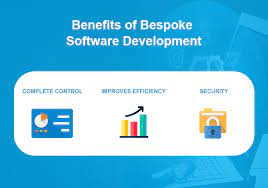Unlocking Business Potential Through Bespoke Software Development
The Power of Bespoke Software Development
In today’s fast-paced and competitive business environment, having the right tools can make all the difference. Off-the-shelf software solutions are readily available, but they may not always meet the unique needs and requirements of your business. This is where bespoke software development comes in.
Bespoke software development involves creating custom software tailored specifically to your business processes, goals, and challenges. Unlike generic off-the-shelf solutions, bespoke software is designed from the ground up to address your specific needs, providing a competitive edge and driving efficiency.
Benefits of Bespoke Software Development
One of the key advantages of bespoke software is its scalability. As your business grows and evolves, bespoke software can be easily adapted and expanded to accommodate new requirements without the need for a complete overhaul.
Furthermore, bespoke software offers greater flexibility and customization options. You have full control over the features, functionality, and user interface, ensuring that the end product aligns perfectly with your business processes and workflow.
Security is another critical aspect where bespoke software excels. Off-the-shelf solutions are more vulnerable to security breaches due to their widespread use and predictable vulnerabilities. With bespoke software, you can implement robust security measures tailored to your specific needs.
Challenges of Bespoke Software Development
While bespoke software development offers numerous benefits, it also comes with its own set of challenges. Custom development projects require careful planning, thorough requirements gathering, and effective communication between stakeholders to ensure successful implementation.
Additionally, bespoke software development can be more time-consuming and costly compared to off-the-shelf solutions. However, the long-term benefits and competitive advantages gained from custom-built software often outweigh the initial investment.
Conclusion
Bespoke software development is a powerful tool that empowers businesses to optimize their operations, enhance productivity, and stay ahead of the competition. By investing in custom-built solutions tailored to your unique needs, you can unlock new opportunities for growth and success in today’s dynamic business landscape.
6 Essential Tips for Successful Bespoke Software Development
- Clearly define project requirements and objectives.
- Communicate effectively with the development team throughout the process.
- Prioritize security measures to protect sensitive data.
- Regularly test and debug the software to ensure functionality and performance.
- Document all aspects of the software development process for future reference.
- Provide training and support for end-users to maximize adoption and satisfaction.
Clearly define project requirements and objectives.
To ensure the success of a bespoke software development project, it is crucial to clearly define project requirements and objectives from the outset. By establishing a detailed roadmap that outlines the specific needs, goals, and expectations of the project, stakeholders can align their efforts and resources effectively. Clear project requirements help developers understand the scope of work, make informed decisions during development, and deliver a solution that meets the client’s exact specifications. Additionally, well-defined objectives provide a framework for measuring progress and ensuring that the final product aligns with the desired outcomes. By prioritizing clarity and precision in defining project requirements and objectives, businesses can set themselves up for a successful bespoke software development journey.
Communicate effectively with the development team throughout the process.
Effective communication with the development team is crucial throughout the bespoke software development process. Clear and consistent communication helps ensure that all stakeholders are aligned on project goals, requirements, and timelines. By maintaining open lines of communication, both parties can address any issues or changes promptly, leading to a smoother development process and a final product that meets the client’s expectations. Regular updates and feedback sessions also allow for transparency and collaboration, fostering a strong partnership between the client and the development team.
Prioritize security measures to protect sensitive data.
When embarking on bespoke software development, it is crucial to prioritize security measures to safeguard sensitive data. By implementing robust security protocols and encryption techniques, businesses can mitigate the risk of data breaches and unauthorized access. Protecting confidential information is paramount in today’s digital landscape, and investing in stringent security measures ensures the integrity and trustworthiness of custom-built software solutions.
Regularly test and debug the software to ensure functionality and performance.
Regularly testing and debugging bespoke software is crucial to ensure its functionality and performance. By conducting thorough testing processes, developers can identify and resolve any issues or bugs that may impact the software’s operation. This proactive approach not only enhances the overall quality of the software but also helps maintain its reliability and efficiency over time. Consistent testing and debugging are essential steps in the bespoke software development process to deliver a robust and stable solution that meets the client’s specific requirements effectively.
Document all aspects of the software development process for future reference.
Documenting all aspects of the software development process is crucial for future reference and ongoing improvement. By maintaining detailed documentation, including requirements, design decisions, code structure, testing procedures, and any challenges faced during development, teams can ensure transparency, consistency, and knowledge transfer. This documentation serves as a valuable resource for troubleshooting issues, onboarding new team members, and revisiting past projects to leverage insights for future endeavors. Investing time in thorough documentation not only enhances collaboration and communication within the team but also contributes to the overall efficiency and success of bespoke software development projects.
Provide training and support for end-users to maximize adoption and satisfaction.
To maximize adoption and satisfaction of bespoke software development, it is crucial to provide comprehensive training and support for end-users. By offering training sessions and ongoing support, users can better understand the software’s functionalities, leading to increased proficiency and confidence in utilizing the custom solution effectively. This approach not only enhances user satisfaction but also promotes higher adoption rates, ensuring that the bespoke software delivers maximum value to the organization.




